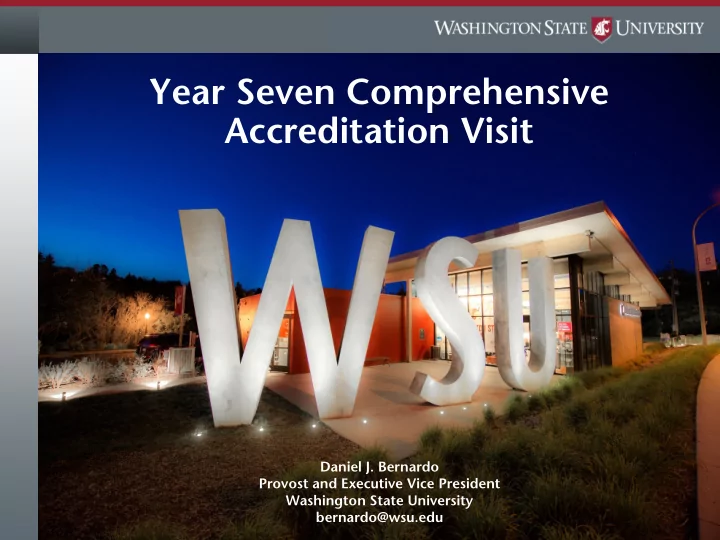

Year Seven Comprehensive Accreditation Visit Daniel J. Bernardo Provost and Executive Vice President Washington State University bernardo@wsu.edu
Northwest Commission on Colleges and Universities (NWCCU) Washington State University is federally accredited by the Northwest Commission on Colleges and Universities (NWCCU) – One of six regional accrediting bodies for all U.S. institutions of higher education – Works with the U. S. Department of Education – Oversees all schools in Alaska, Idaho, Montana, Nevada, Oregon, Utah, and Washington provost.wsu.edu
Importance of Institutional Accreditation • Non-accredited institutions cannot receive federal or state financial aid for students • Employers are skeptical of degrees earned from non-accredited institutions • Graduates of non-accredited institutions cannot stand for licensing exams • Researchers at non-accredited institutions are usually ineligible to compete for research funds • Professional accrediting organizations will not consider degree programs that are housed in non-accredited institutions • Transfer of credit is almost impossible without it WSU’s Year Seven Visit is scheduled April 9-11, 2018 provost.wsu.edu
Valuable Aspects of Accreditation • Helps align priorities with mission and strategic goals • Helps direct resources to identified priorities • Gives the university an accurate and realistic picture of what it is doing well, and what can be improved • Encourages a focus on educational best practices Education Scholarship Service provost.wsu.edu
Accreditation Review Process • As an accredited institution, the upcoming review is to reaffirm Washington State University’s accreditation. – A complete university review cycle is seven years based on expectations for continuous improvement. – The 7-year review includes an on-site evaluation. WSU’s Year Seven Visit is scheduled April 9-11, 2018 provost.wsu.edu
Self-Study Report • At several points during the 7-year cycle, the institution writes a self-study report that addresses required performance standards. – WSU’s 7-year report was prepared during 2016-17 academic year, and coordinated through the Office of the Provost. – The report is oriented around WSU’s Strategic Plan and advancement toward institutional goals. – The report emphasizes the educational mission of WSU, and also includes research and outreach. – The Accreditation Report will be available at accreditation.wsu.edu. provost.wsu.edu
NWCCU Assembled Review Team • Will visit WSU Pullman on April 9-11, 2018 to review the entire WSU system. • Team consists of administrators, can include staff and faculty from similar institutions (peers). • The review team gathers information to elaborate on topics in the self-study report. • Can meet with whomever they like while on campus. • Following the site visit, the review team will discuss immediate reactions with President Schulz. The review team will follow up with formal report/recommendation to NWCCU. provost.wsu.edu
Five Performance Standards • Mission and Core Themes: The institution’s activities are guided by a mission statement that includes essential themes. • Resources and Capacity: The institution has adequate resources and capacity to fulfill its mission and accomplish core theme objectives. • Planning and Implementation: The institution has formal, flexible, and participatory planning and implementation processes. • Effectiveness and Improvement: The institution regularly collects data on clearly defined indicators of achievement, analyzes those data, and uses the results to improve performance. • Mission Fulfillment, Adaptation, and Sustainability: The institution publishes evidence-based evaluations of its performance. provost.wsu.edu
Recommendations from NWCCU • Recommendations are problem areas or issues that need immediate attention. • Progress must be documented by a specified date. • If progress on a Recommendation is not made, NWCCU can increase demands and/or implement oversight, and/or impose an adverse status (warning or probation). • Addressing Recommendations can require re-prioritization of resources and suspension of university initiatives. Recommendations can be disruptive; WSU wants to avoid them if at all possible. provost.wsu.edu
Representative Recommendations • The following are representative examples of recent recommendations received by WSU: – Instructed to identify which of its strategic plan metrics are considered “mission essential.” – Clarify how strategic plan metrics, and student learning outcomes, relate to mission fulfillment. – Strengthen faculty involvement in assessment of student learning outcomes and use of findings for decision making. provost.wsu.edu
Commendations from NWCCU • WSU can receive, and has received, Commendations for things we are doing exceptionally well. • Commendations can be received in any area, but are often focused on academics, student supports, technology, strategic planning. • Commendations are a matter of public record and are shared with the legislature, so they are valuable to earn. provost.wsu.edu
Representative Commendations • The following are representative examples of recent commendations received by WSU: – Thorough communication and explanation of degree program structures and requirements to undergraduate and graduate students. – Strong emphasis on assessment of student learning outcomes, on all campuses and in graduate as well as undergraduate programs. – A clear commitment to mission-critical goals and movement toward aspirational goals. provost.wsu.edu
Questions accreditation.wsu.edu provosts.office@wsu.edu
Recommend
More recommend